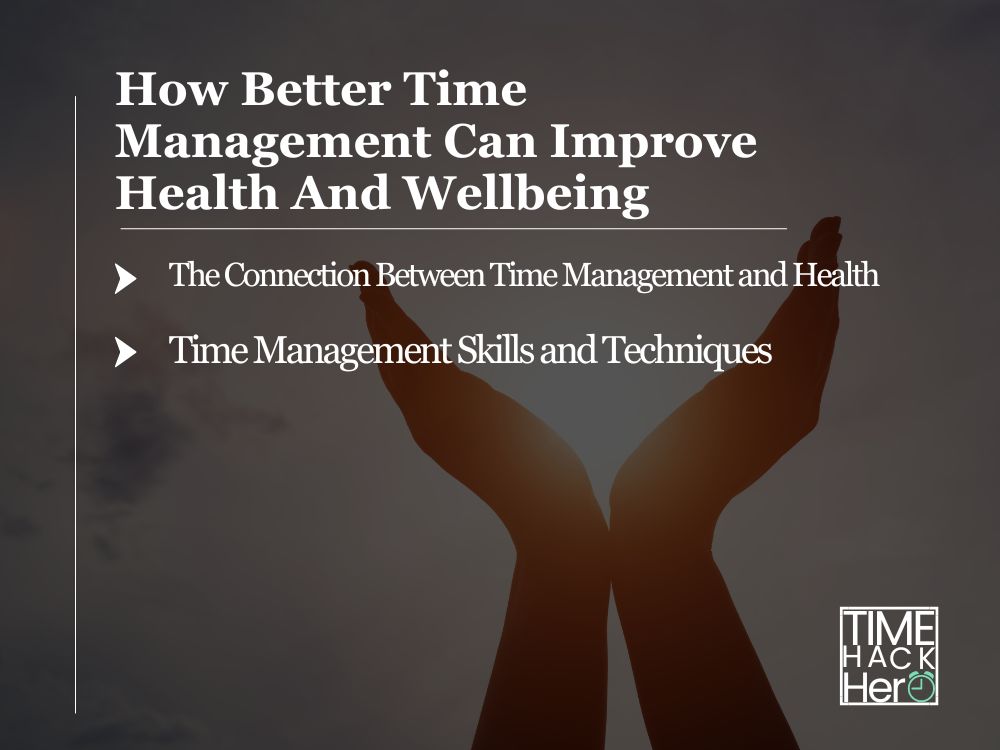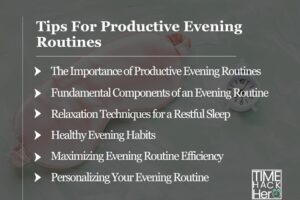In today’s fast-paced world, time management plays a crucial role in maintaining overall health and well-being. Striking the right balance between personal and professional life is a constant challenge that requires effective scheduling and prioritization. By mastering time management techniques, individuals can not only meet their daily goals but also create an environment that fosters mental and physical wellness.
Learning to allocate time effectively allows for a more structured approach to daily tasks and reduces procrastination, leading to an increase in productivity and self-confidence. When people gain control of their time, they can better align their activities with their values and beliefs, ultimately promoting a sense of self-accomplishment. Incorporating time management skills into one’s routine can also reduce stress, anxiety, and the risk of burnout, as it encourages the allotment of time for self-care and reducing cortisol levels.
Incorporating time management into daily life can improve health and well-being by ensuring essential tasks like exercise, proper nutrition, and sleep are given adequate attention. By making a conscious effort to plan and schedule wellness-focused activities, individuals can not only meet their work-related goals but also prioritize pursuits that contribute significantly to overall health and personal satisfaction.
Table of Contents
The Connection Between Time Management and Health
Stress Reduction
Better time management can lead to lower stress levels. When tasks are organized and deadlines are met with ease, it minimizes the feeling of being overwhelmed. It helps individuals gain control over their work, leading to a more relaxed mental state. This reduces the negative effects of stress, such as anxiety and sleep issues, allowing for a healthier life.
Improved Mental Health
Effective time management is closely related to an individual’s mental health. Research has shown a measurable link between good time management and overall wellbeing. By successfully managing their time, individuals can achieve a sense of control over their lives. This enables them to allocate time to activities that contribute to self-care, such as engaging in relaxing hobbies. These activities, in turn, help in the release of stress and decrease cortisol levels, preventing burnout and promoting a healthier mental state.
Physical Health Benefits
Proper time management also contributes to better physical health. By implementing efficient time management strategies, individuals can allocate sufficient time for activities that improve their physical wellbeing, such as:
- Regular exercise
- Balanced meals
- Adequate sleep
These factors work together, ensuring a person’s body functions optimally and reduces the risk of developing health issues caused by poor time management, such as sleep deprivation, obesity, and chronic stress.
Time Management Skills and Techniques
Setting Goals and Prioritizing Tasks
A crucial aspect of time management involves setting clear goals and prioritizing tasks. By identifying what you want to achieve, you can break down your objectives into manageable tasks. Prioritization ensures that you focus on completing the most urgent and essential tasks first. Consider using the following steps in this process:
- Write down your goals and objectives
- Break your goals into smaller tasks
- Determine the importance and urgency of each task
- Order tasks based on priority
Scheduling and Calendars
Scheduling and using a calendar can significantly improve time management. Organize your tasks in a digital or physical calendar, specifying time slots for each activity. This way, you allot dedicated time to accomplish tasks without feeling overwhelmed. To make your scheduling more effective, adhere to the following tips:
- Set and follow your calendar
- Allocate buffer time between tasks for any unforeseen circumstances
- Review your schedule daily and adjust as needed
Managing Distractions
Minimize distractions to improve focus and productivity. Some helpful strategies to manage interruptions include:
- Turn off notifications on electronic devices
- Set boundaries with friends and family regarding work hours
- Create a comfortable environment and workspace
Eisenhower Matrix
The Eisenhower Matrix is an essential time management technique that helps prioritize tasks based on their urgency and importance. This method divides tasks into four categories:
- Urgent and important
- Important, but not urgent
- Urgent, but not important
- Not urgent and not important
By categorizing your tasks, you can devise an effective strategy to tackle them based on their urgency and importance, thus enhancing your overall time management skills.
Pomodoro Method
The Pomodoro Method promotes productivity through short, focused work periods followed by a brief break. Here’s how to implement the Pomodoro Technique:
- Choose a task
- Set a timer for 25 minutes and work on the task undisturbed
- When the timer rings, take a 5-minute break
- Repeat the process three times
- After completing four Pomodoro sessions, take a longer break (15-30 minutes)
This technique helps maintain focus, productivity, and energy throughout the day, while also promoting better time management.









